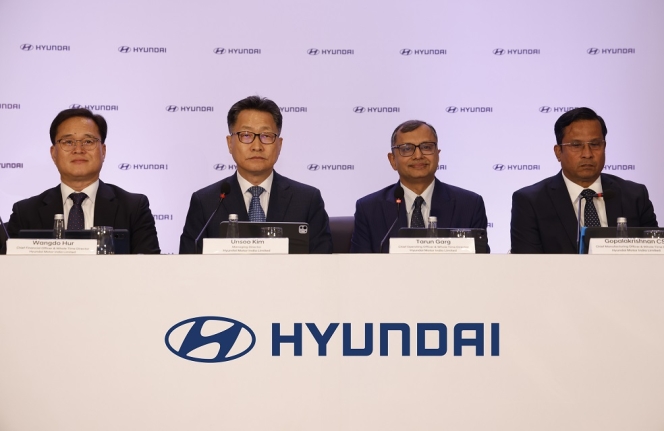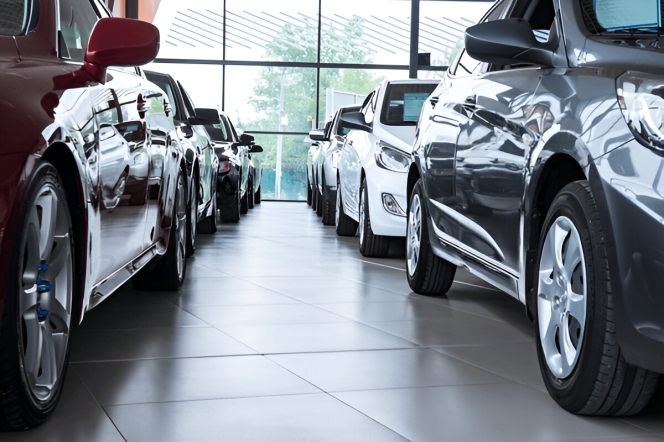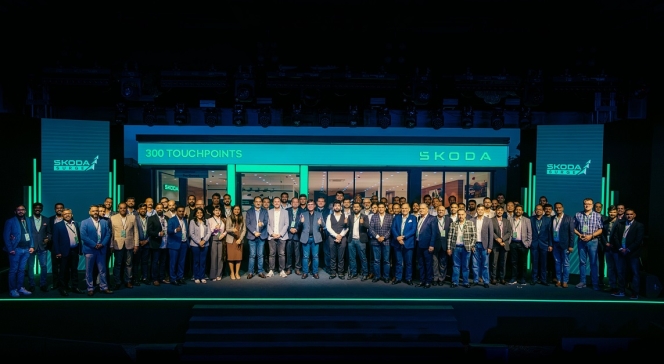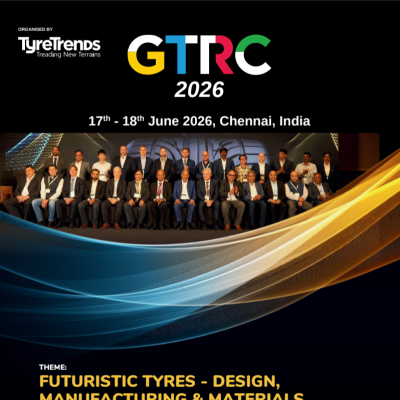- IPO
- Hyundai Motor India
- Tarun Garg
- Hyundai Alcazar
- Hyundai Exter
- Hyundai Grand i10 Nios
- Hyundai Venue
- Hyundai Motor Group
Hyundai Looks To Leverage India Growth Story, Says IPO Listing Funds to Be Deployed Towards New Products, Tech and R&D
- By Nilesh Wadhwa
- October 09, 2024

It is nearly 20 years since India saw a carmaker getting listed on the stock exchange, and this time, it is a South Korean automaker Hyundai Motor India.
The automaker aims to raise upto INR 278 billion by offloading 17.5 percent stake at a price band in the range of INR 1,865 to INR 1,960 per share.
The issue will be available for subscription between 15 October to 17 October, 2024.
This will also make it the largest IPO (Initial Public Offering) in India till date, surpassing Life Insurance Corporation of India’s INR 210 billion IPO that debuted in May 2022; and the biggest IPO listing for 2024 in the world.
Hyundai Motor India, will become the latest automaker in India to debut on the stock exchange, after Maruti Suzuki India’s debut in 2003.
What’s interesting to note is that the funds raised by the company’s parent company Hyundai Motor Group, which then is expected to re-invest the funds in the company, but the exact quantum and timeline has yet to be clarified.
The IPO comes at a time when the Indian stock market is seeing huge traction with lot many new companies entering the foray. Hyundai Motor Group sees India as a huge growth market, that not only contributes to 6 percent of the company’s global revenues but also acts as a leading exporter for the Asian market.
The company has company a long way since it first introduced the Santro hatchback in 1998 and has made a prominent name for itself as the second largest car maker in India for over two decades, and the largest passenger vehicle exporter.
In FY2024, the company reported wholesales of 777,876 units, which marks 13 percent CAGR growth over FY2022 and FY2023; similarly, the average selling price has increased from INR 666,455 to INR 771,840; FY2024 revenue growth of 47 percent over FY2022 and net income growing from INR 29,016 million to INR 60,600 million in FY2024 respectively.
Hyundai Motor India aims to deploy the new funds (potential investment from Hyundai Motor Group) towards building new products, investment in new technologies and R&D in the country.
| HYUNDAI MOTOR INDIA | ||||
| Year | Sales (in units) | Avg Sales Price (in INR) | Revenue (in INR million) | Net income (in INR million) |
| FY2022 | 610,760 | 669,455 | 473,784 | 29,016 |
| FY2023 | 720,565 | 725,416 | 603,076 | 17,093 |
| FY2024 | 777,876 | 771,840 | 698,291 | 60,600 |
| Source: Hyundai India | ||||
- BYD India
- BYD
- Build Your Dreams
- SAMTA BYD
- Rajeev Chauhan
- BYD Sealion 7
- BYD Seal
- BYD Atto 3
- BYD eMAX 7
- Bhupesh Sahni
- Bhanu Ketarpal
BYD Opens It’s 42nd Dealership Showroom In India
- By MT Bureau
- July 18, 2025

BYD India, a subsidiary of China-headquartered BYD (Build Your Dreams) a leading manufacturer of electric vehicles, inaugurated its 42nd dealership showroom in the country.
The new facility, located in Sonipat, Haryana, was launched in association with SAMTA BYD (Samta Greentech), further strengthening BYD’s growing presence in the Northern part of India.
The showroom spread across 2,000 sqft will showcase BYD’s all-electric vehicle range, provide test drives, financing options and aftersales support. It will display the company’s electric passenger vehicle lineup consisting of the BYD Sealion 7, BYD Seal, BYD Atto 3 and the BYD eMAX 7.
Rajeev Chauhan, Head of Electric Passenger Vehicles Business, BYD India, said, “The launch of our 42nd showroom in India reflects BYD’s continued commitment to expanding clean mobility across key regions. Haryana is a high-potential EV market, and with partners like SAMTA BYD, we are confident in delivering not just world-class electric vehicles, but also a seamless and engaging customer experience. Sonipat is an important step in our journey to bring sustainable innovation closer to communities across India.”
Bhupesh Sahni (Director) & Bhanu Khetarpal (Director) of SAMTA BYD, said, “We are proud to partner once again with BYD in bringing cutting-edge sustainable mobility solutions to Sonipat. With increasing awareness and demand for sustainable transportation, our new facility is well-positioned to cater to the needs of this growing market."
- Jeep India
- Jeep Trail Editions
- Jeep Trust programme
- Jeep Compass
- Jeep Meridian
- Jeep Compass Trail Edition
- Jeep Meridian Trail Edition
- SUVs
Jeep India Launches Trail Editions Of Compass And Meridian SUVs
- By TT News
- July 17, 2025

Jeep India has unveiled the rugged Trail Editions of its popular SUVs – the Jeep Compass and Jeep Meridian – combining bold styling with exclusive ownership benefits under the new ‘Jeep Trust’ programme. Available from 15 July 2025, these special editions cater to adventure enthusiasts seeking distinctive design and enhanced value.
The Jeep Compass Trail Edition features striking exterior upgrades, including Trail Edition decals, a matte black grille and Neutral Grey accents on key elements like the roof rails, ORVMs and badges. It rides on 18-inch Granite Metallic alloy wheels, while the interior sports black leatherette upholstery with red contrast stitching, a dark camouflage motif and Trail Edition-branded floor mats.
Meanwhile, the Jeep Meridian Trail Edition exudes premium ruggedness with a high-gloss black roof, signature hood decals and Neutral Grey highlights on the grille and cladding. Piano Black accents and red front fascia details complete its bold stance. Inside, it offers a black vinyl cabin with ruby red accents, camouflage appliques and skid plates for an adventurous touch.
The ‘Jeep Trust’ programme enhances ownership with added benefits. Compass Trail buyers receive a 3-year maintenance package, a 5-year warranty and an INR 20,000 cash benefit, while Meridian Trail owners get a complimentary 3-year maintenance plan.
Priced between INR 2,541,000 and INR 3,727,000 (ex-showroom), the Trail Editions are based on the Compass Longitude (O) and Meridian Limited (O) variants, retaining their core features while adding exclusive styling and value-packed ownership perks. Available for a limited time, these models can be booked at Jeep dealerships across India.
Kumar Priyesh, Business Head and Director – Automotive Brands, Stellantis India, said, “The Trail Editions reflect the Jeep brand’s core values of freedom, adventure, authenticity and passion. These bold new editions provide a differentiated ownership experience for customers who want to stand out — both on and off the road. With the addition of the Jeep Trust programme, we are reaffirming our commitment to offering value beyond the drive.”
India’s Auto Industry Posts Mixed Q1 Performance as Passenger Vehicle Exports Hit Record High
- By MT Bureau
- July 15, 2025

India’s automobile industry delivered a mixed performance in the first quarter of 2025-26, with passenger vehicle exports reaching an all-time high even as domestic sales remained largely flat, according to data released by the Society of Indian Automobile Manufacturers (SIAM) on Monday.
Passenger vehicle sales crossed the one million mark for the second consecutive year in Q1, reaching 1.01 million units, though this represented a 1.4 percent decline compared to the same period last year. The segment’s performance was buoyed by utility vehicles, which now account for 66 percent of passenger vehicle sales and posted 3.8 percent growth, whilst passenger cars declined 11.2 percent.
The standout performer was exports, with passenger vehicles achieving record Q1 exports of 204,000 units, marking a 13.2 percent year-on-year increase. This surge was driven by stable demand across most markets, with particularly strong performance in the Middle East and Latin America, alongside recovery in neighbouring markets such as Sri Lanka and Nepal.
"The performance of the Auto industry was relatively flat, though the retail registration for Passenger Vehicles, Two-Wheelers and Three-Wheelers were marginally higher than the previous Q1," said Shailesh Chandra, President of SIAM.
The two-wheeler segment faced headwinds with wholesale sales declining 6.2 percent to 4.67 million units due to inventory correction across the industry. However, retail registrations increased 5 percent during the quarter, driven by the marriage season and positive demand sentiments. Two-wheeler exports showed robust growth of 23.2 percent to 1.14 million units.
Three-wheelers achieved their highest-ever Q1 sales of 165,000 units, representing marginal growth of 0.1 percent. The segment benefited from increased economic activity supporting urban transportation demand and easier financing options. Exports in this category surged 34.4 percent to 96,000 units.
Commercial vehicles posted a marginal decline of 0.6 percent to 223,000 units, though exports grew strongly by 23.4 percent to around 20,000 units.
Looking ahead to Q2, SIAM expressed cautious optimism despite ongoing challenges. The upcoming festive season is expected to drive demand, particularly for passenger vehicles and two-wheelers, whilst an above-normal monsoon could aid rural income recovery.
"With the upcoming festival season coupled with the benefits of RBI repo rate cuts, we expect consumer sentiments to improve," Chandra added.
The Reserve Bank of India's cumulative repo rate cuts of 100 basis points over the past six months are expected to gradually ease borrowing costs, potentially boosting consumer sentiment and affordability.
However, supply-side challenges persist, particularly the recent export licensing requirement from China on rare earth magnets, which has raised concerns for original equipment manufacturers across all categories.
"Sales of Passenger Vehicles in Q1 of 2025-26 de-grew by (-) 1.4 percent, posting sales of 1.01 million units as compared to Q1 of previous year," said Rajesh Menon, Director General of SIAM.
In June alone, passenger vehicle sales declined 7.4 percent to 312,849 units, whilst two-wheeler sales fell 3.4 percent to 1.56 million units. Three-wheeler sales bucked the trend with 3.8 percent growth to 61,828 units.
The industry's overall domestic sales fell 5.1 percent in Q1 to 60.75 million units, reflecting the challenging operating environment facing India's automotive sector.
Skoda Auto India Surpasses 300 Touchpoint Across 172 Cities
- By MT Bureau
- July 14, 2025

Czech automotive brand Skoda Auto India has announced that it has achieved a new milestone by surpassing 300 customer touchpoints in the country. With this, the OEM has a network of touchpoints in 172 cities across the country and is rapidly expanding its presence in not just tier 1 cities, but also tier 2 and tier 3 markets.
Interestingly, 86 percent of the recent expansion have happened in these geographies and 75 percent of the 300 touchpoints are directly servicing customers in the same cities.
The Czech automaker is marking its 25th anniversary in the country and 130 years globally. It was just recently, Skoda Auto India reported its highest-ever half-yearly sales in the first half of 2025.
Ashish Gupta, Brand Director, Skoda Auto India, said, "Our growing network makes our product range more accessible to customers, while enabling smarter, faster service with consistent quality, across the country. With a strong emphasis on ‘growing together and getting closer to customers’, a large part of our expansion has been undertaken with Skoda Auto’s long-term dealer partners in India, while also bringing new partners with a proven track record of customer centricity into the fold. This expansion is a step forward in strengthening Skoda Auto’s legacy in India and delivering on our promise of safety, value, and a truly rewarding ownership experience."
The expansion the company shared perfectly complements its product strategy, which has been significantly boosted by the Kylaq SUV, joining the Kushaq and Kodiaq to offer an ‘SUV For Everyone.’ The Slavia continues the brand's sedan legacy, with a new global icon expected to launch in India soon.





Comments (0)
ADD COMMENT